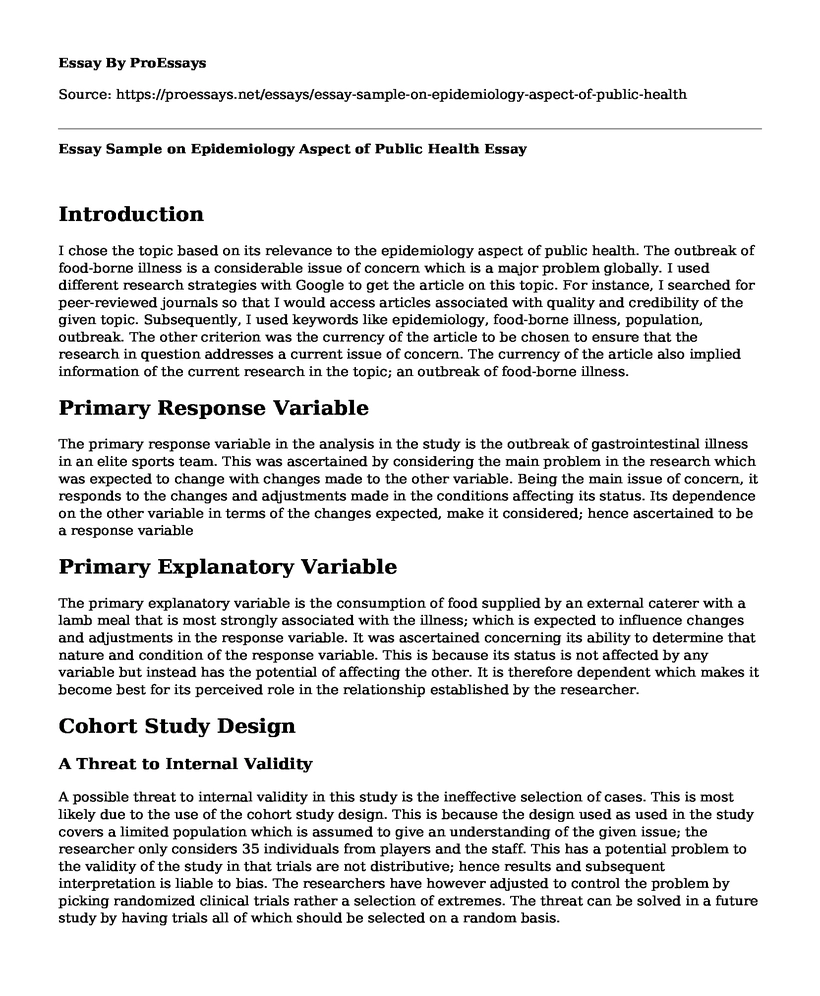Introduction
I chose the topic based on its relevance to the epidemiology aspect of public health. The outbreak of food-borne illness is a considerable issue of concern which is a major problem globally. I used different research strategies with Google to get the article on this topic. For instance, I searched for peer-reviewed journals so that I would access articles associated with quality and credibility of the given topic. Subsequently, I used keywords like epidemiology, food-borne illness, population, outbreak. The other criterion was the currency of the article to be chosen to ensure that the research in question addresses a current issue of concern. The currency of the article also implied information of the current research in the topic; an outbreak of food-borne illness.
Primary Response Variable
The primary response variable in the analysis in the study is the outbreak of gastrointestinal illness in an elite sports team. This was ascertained by considering the main problem in the research which was expected to change with changes made to the other variable. Being the main issue of concern, it responds to the changes and adjustments made in the conditions affecting its status. Its dependence on the other variable in terms of the changes expected, make it considered; hence ascertained to be a response variable
Primary Explanatory Variable
The primary explanatory variable is the consumption of food supplied by an external caterer with a lamb meal that is most strongly associated with the illness; which is expected to influence changes and adjustments in the response variable. It was ascertained concerning its ability to determine that nature and condition of the response variable. This is because its status is not affected by any variable but instead has the potential of affecting the other. It is therefore dependent which makes it become best for its perceived role in the relationship established by the researcher.
Cohort Study Design
A Threat to Internal Validity
A possible threat to internal validity in this study is the ineffective selection of cases. This is most likely due to the use of the cohort study design. This is because the design used as used in the study covers a limited population which is assumed to give an understanding of the given issue; the researcher only considers 35 individuals from players and the staff. This has a potential problem to the validity of the study in that trials are not distributive; hence results and subsequent interpretation is liable to bias. The researchers have however adjusted to control the problem by picking randomized clinical trials rather a selection of extremes. The threat can be solved in a future study by having trials all of which should be selected on a random basis.
A Threat to External Validity
The potential threat to the external validity in this research is the limited ability to connect the real world and the "experimental world" established by the study design. This occurs since the data collected in reality are however analyzed in a fictional manner making it difficult to reflect on the actual clinical setting considers the cases of the foodborne illness under the study. The design considers specific clinical cases which could be affecting only a specified population, and this may not be happening elsewhere. The study design, therefore, limits connecting the problem to the related real-world phenomena. The researcher strived to reduce selection bias to reduce the problem, and this should be a strategic method incorporated in future research.
Perfectly Done Aspect of the Study Design
The study design introduced unique perspectives of connecting the two variables involved, which are hardly covered in the literature previously published on the topic. For example, the design was implemented through the use of a modified questionnaire which would accommodate the information regarding all the related gastrointestinal illness. Moreover, the design restricted the research to consider the cases of the individuals who were within the premise of the sports club within 72 hours of the report of the illness.
References
1. Kapaya F, Mwansa F, Sakubita P, Gama A, Langa N, Chewe O et al. A foodborne disease outbreak investigation experience in a College in Lusaka, Zambia, 2017. Pan African Medical Journal [Internet]. 2018 [cited 23 February 2019];29. Available from: https://www.panafrican-med-journal.com/content/article/29/100/full/
2. Cavanagh K, Johnstone T, Huhtinen E, Najjar Z, Lorentzos P, Shadbolt C et al. Foodborne Illness Outbreak Investigation in a High-Profile Sports Club. Sports Medicine - Open [Internet]. 2017 [cited 23 February 2019];3(1). Available from: https://www.ncbi.nlm.nih.gov/pmc/articles/PMC5483224/
3. Setia M. Methodology series module 3: Cross-sectional studies. Indian Journal of Dermatology [Internet]. 2016 [cited 23 February 2019];61(3):261. Available from: https://www.ncbi.nlm.nih.gov/pmc/articles/PMC4885177/
Cite this page
Essay Sample on Epidemiology Aspect of Public Health. (2022, Nov 22). Retrieved from https://proessays.net/essays/essay-sample-on-epidemiology-aspect-of-public-health
If you are the original author of this essay and no longer wish to have it published on the ProEssays website, please click below to request its removal:
- Mr. Cain's Health Situation Case Study
- Essay Sample on Matrix Care Application
- CNO Standards in Nursing - Essay Sample
- Line Organization Structure of Baptist Hospital Paper Example
- Research Paper on Arthritis: OA & RA - Causes, Symptoms, & Treatment
- Cell Membrane: Vital Role in Physiological Functions - Research Paper
- Essay Example on U.S. Healthcare Cost Transparency: Challenges & Benefits







